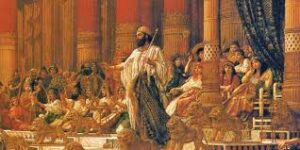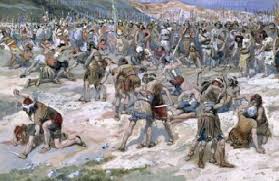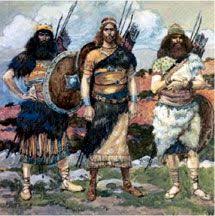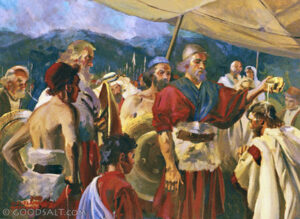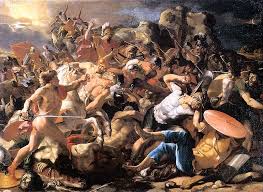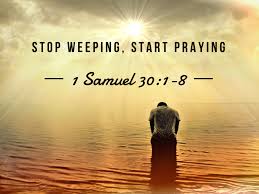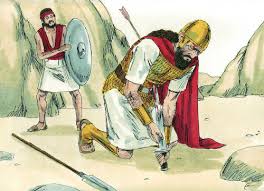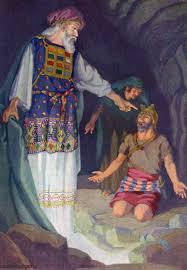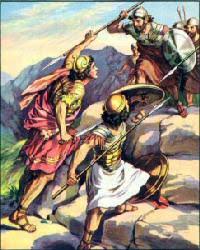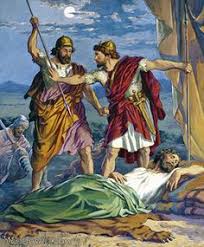Cj – Abner Goes Over to David Second Samuel 3: 6-21
Abner Goes Over to David
Second Samuel 3: 6-21
Abner goes over to David DIG: Why would Ish-Bosheth be mad if Abner slept with one of Sha’ul’s concubines? From the way Abner responded to the accusation, do you think he was guilty? If Abner has known all along that God promised to make David king, why had he opposed him up until now? Why didn’t Ish-Bosheth resist Abner taking Michal back to David? How do you think Michal felt about leaving Paltiel for David? How extensive was Abner’s control over the elders of Isra’el? Why did he want to come over to David’s side? In what ways does David’s patient waiting on God’s blessing foreshadow Messiah’s example?
REFLECT: Where in your life do you feel the need to “strengthen your position” as Abner did? David experienced the pain of broken promises from Sha’ul, yet trusted in God’s promises. How trusting are you of other’s promises? Of the promises of ADONAI? How does a person who is confident in the fulfillment of God’s purposes live and respond differently to life’s challenges than someone who isn’t?
1010 to 1003 BC
The overriding question for the Ruach ha-Kodesh at this juncture is how will David win the north, which is still loyal to Sha’ul? We expect the principles in the conflict to be David and Ish-Bosheth, the legitimate (but pitiful) heir of Sha’ul. This powerful narrative, however, contradicts our expectations and makes clear that neither David nor Ish-Bosheth would be key to claiming the north. The key was Abner.227
The Cause of the Betrayal: During the war between the house of Sha’ul and the house of David, Abner had been strengthening his own position. Abner was a blood relative to Sha’ul and the one who made Ish-Bosheth king and kept him in power. Now Sha’ul had had a concubine named Rizpah daughter of Aiah (the heroine of the tragic story of Second Samuel 21:7-9 and 14b). And Ish-Bosheth said to Abner, “Why did you sleep with my father’s concubine” (Second Samuel 3:6-7). Why was this a threat? Because ancient law declared that a king’s harem was passed down to his successor. Consequently, to claim a king’s concubine was to claim the throne. This will come up several more times, for example in Second Samuel 12:8, Sha’ul’s concubines passed over to David because David claimed the throne. Still later, in Second Samuel 16:21-22, Absalom will claim David’s concubines as Absalom claimed the throne. Any man who even asked for one of those women was asking for the crown and guilty of treason. This is what lead to the death of Adonijah in First Kings 2:17-22. It is possible that Abner took Rizpah just to start an argument with Ish-Bosheth. If so, he succeeded.
Abner was very angry because of what Ish-Bosheth said because his actions had been discovered. “What am I,” he shouted, that you treat me with such contempt? A dog’s head in Y’hudah? In the East dogs were chiefly found prowling about towns, half-wild, living on dead bodies and garbage. Hence, this term was one of contempt. Till this moment I have shown only kindness (Hebrew: chesed) to the house of Sha’ul your father, and to his brothers and to his friends; and I haven’t handed you over to David.” But that will no longer be the case. Yet you choose today to pick a fight with me over this woman? Abner faked his indignation. You will notice he didn’t answer the question.
The dispute over this woman costs Ish-Bosheth the loyalty of Abner and his crown. Sha’ul’s son couldn’t win anymore, than Sha’ul could win. Both Ish-Bosheth and Abner understood that their actual roles were reversed from their official positions of king and general. Abner had all the power and all the leverage in the relationship. What Abner had done was not simply a sex act. It was a defiant public, political challenge that could not be ignored. But Ish-Bosheth was helpless and politically impotent; therefore, Abner is free to negotiate as he pleased.228 So in retaliation, Abner declared: May God bring terrible curses on Abner and worse ones yet if I don’t accomplish what ADONAI swore to David – to transfer the kingdom, from the house of Sha’ul and set up the throne of David over Isra’el and Y’hudah, from Dan to Beersheba. The word of Samuel to David, though spoken in the private family gathering (to see link click Ah – Samuel Anoints David), and unrecorded except as Samuel’s instructions from ADONAI, had become widely known. Now even Abner, who in the past had willingly opposed what he knew to be God’s revealed purpose, found himself helping to fulfill it.229 Ish-Bosheth did not dare say another word to Abner because he was afraid of him (Second Samuel 3:8-11). In the end, the mighty house of Sha’ul merely evaporated in fear. Cowardly, and powerless, Ish-Bosheth could do nothing to stem the tide of Abner’s rising ambitions.
Abner’s Negotiations with David: The preliminary meeting between Abner and David took place through messengers rather than face to face. Abner immediately sent messengers to David with this rhetorical question: Who is going to control the Land? Implying that it was in his power to make whomsoever he pleased king over Isra’el. If you make yourself my ally, I will use my power to hand all Isra’el over to you (Second Samuel 3:12). He wanted a promise from David that he would retain a position of power as commander of the army in the new government. But David was not caught off guard by all of this. He knew he was being invited to enter into a covenant with a man who was betraying his master, and who claimed to have the power to bring David the northern Kingdom. Such a ruthless man threatened to be a rival to David at some point. He could not be trusted.
David was willing to accept Abner’s proposal, but he laid down a precondition. He chose his words very carefully and sent this reply, “Very well, I will be your ally – on one condition: you will not come into my presence unless you bring Michal, Sha’ul’s daughter, with you. Then to show no ill will toward the house of Sha’ul, David sent messengers to Ish-Bosheth because negotiations with Abner needed to be public. He would not conspire to overthrow the king of Isra’el. He demanded: Give me my wife Michal, whom I betrothed to myself for the price of a hundred Philistine foreskins (Second Samuel 3:13-14 CJB). David mentions the number that Sha’ul had demanded, although in fact David had paid him double. Michal was still legally the wife of David and David was still legally the son-in-law of Sha’ul. By bringing her back it would help to win over the tribe of Benjamin, who would be the most reluctant tribe of them all to join David. If David could have a child through Michal, this would mean a successor from both houses and this would help win support from the house of Sha’ul. David had not seen her in about eight years. However, as we shall see later, she remained childless.230
So Ish-Bosheth gave orders to take her from her husband Paltiel, son of Laish. His fear and subservience to Abner kept him from protesting. Her husband, however, went with her, weeping behind her all the way to Bahurim. Paltiel was her husband in name only because David had never divorced her. But he loved her nonetheless. Then curt, unsympathetic Abner said to him, “Go back home!” And the meek, brokenhearted husband obeyed (Second Samuel 3:15-16). Affairs of state had to take precedence over personal feelings. The rabbis teach that Paltiel was never intimate with Michal, and placed a sword in between them while lying in bed so as not to be tempted.
Abner’s Negotiations with the elders of Isra’el: Abner first conferred with the elders of Isra’el in Mahanaim before accompanying Michal back to Hebron, which would give him a good excuse to talk to David. He said to the elders, “For some time you have wanted to make David your king.” But the tribe of Benjamin in general, and Abner in particular, had overruled them. But Abner’s negotiations with David had changed all of that. There was no reason to delay any longer in making David king over Isra’el. Therefore, he declared: Do it now! For the LORD promised David, “By my servant David I will rescue my people Isra’el from the hand of the Philistines and from the hand of all her enemies” (First Samuel 9:16). Abner and the others recognized YHVH’s will. Secondly, Abner also spoke to the Benjamites in person because this would be the most resistant tribe. Then, having received unanimous agreement, Abner went to Hebron to tell David everything that Isra’el and the whole tribe of Benjamin wanted to do (Second Samuel 3:17-19).
Abner’s Agreement with David: When Abner, who had Michal and an official escort of twenty men with him, came to David at Hebron, David prepared a feast for them. These men included Abner’s bodyguard and representatives of the other tribes. Then Abner said: Let me go at once and assemble all the elders of Isra’el for my lord the king, so that they may make a covenant with you, and that you may rule over all that your heart desires. These must have been the concluding words of a long and detailed discussion between the two men. Mutual respect and trust between Abner and David was growing so David sent Abner away in peace with his blessing (Second Samuel 3:20-21).
As Dale Ralph Davis relates in his commentary on Second Samuel: Abner was not driven to go over to David by theology . . . it was politics. He did not seek to expand David’s Kingdom because he felt the authority of YHVH’s promise, but because he sought his own advantage. If Ish-Bosheth was not going to roll over and play dead, then the best option for Abner was to swing his support to David and use his influence over the northern tribes as a bargaining chip with David, thereby assuring himself of a powerful spot in David’s regime. Abner only quoted Scripture (First Samuel 3:18) when it supported what he wanted to do. He didn’t seek a united monarchy because of divine promise, but because of human pride.
Abners don’t disappear. We meet more of them in the Bible. Not bearing Abner’s name – only his disposition. For example Simon the sorcerer in Acts 8 was the first convert in Samaria under Philip’s ministry. He was all in – profession of faith and baptism. But when Peter and John came, he revealed his true colors, offering to pay them well if they would give him the power to bestow the gift of the Ruach ha-Kodesh when he would lay his hands on someone (Acts 8:18-19). He professed salvation because it would be to his financial advantage. Though both Abner and Simon made an outward profession of being in agreement with the new power- neither of them had any desire to really follow the right path; rather both of their hearts were full of greed. Outward profession cannot change a sinful heart. Even if a person dresses up like a lion – he will never be a lion. Inner heart change is what changes a person. Only by following God with a heart of love can the sinful heart be washed clean and the person be eternally saved (see the commentary on The Life of Christ Ms – The Eternal Security of the Believer),
Whether it is Second Samuel 3 or Acts 8, we must be alert to our own Abner-mentality. Our clichéd line about supporting Messiah’s Kingdom may only be a cover for using it. As we sing, “Kadosh Atah” in shul or “Amazing Grace” in church, we need to examine our own lives to make sure our attendance is not only an outward form of ritual, but from a true love of God and a desire to please Him. Abner is not far away from any of us.




